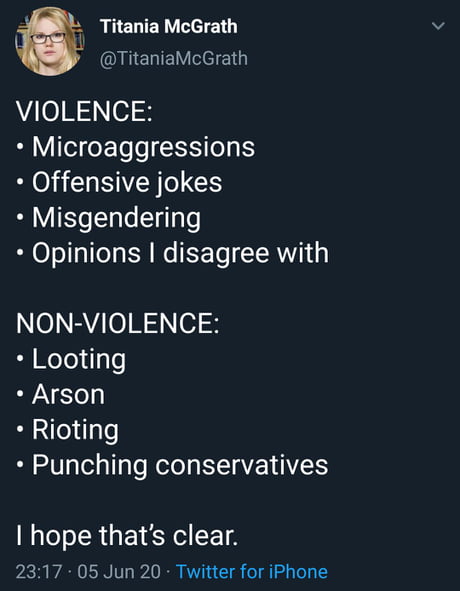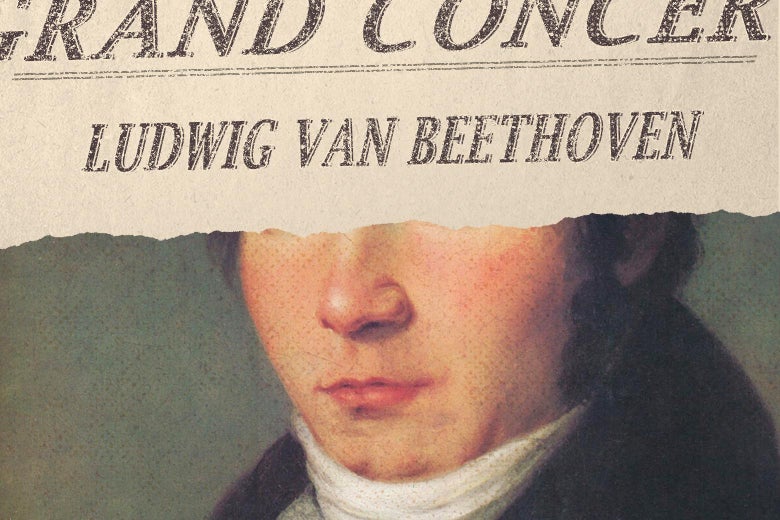You are using an out of date browser. It may not display this or other websites correctly.
You should upgrade or use an alternative browser.
You should upgrade or use an alternative browser.
nivek
As Above So Below
No comment...
...
University Introduces a 12 Step Recovery Program For Whiteness!
The University of Minnesota School of Social Work introduced a twelve-step recovery program for whiteness. The program is aimed at teaching white people about their inherent racism and white supremacy (superiority?) in order to foster a more inclusive society. The lecturer, Cristina Combs, is a young white woman and alumni of the University of Minnesota. In one of the slides in the nearly two-hour webinar, she placed a picture of herself when the rhetorical question of “what does white supremacy look like to you?” was asked.
Although the purpose of the program is to combat racism, the program is racist itself. If “whiteness” were replaced with “blackness” or any other “ness” involving another race, then there would be wall-to-wall coverage of the outrage across all mainstream media in the United States. This reaction may be appropriate, if not for the clear amount of hypocrisy present when the target of attack is white people.
Anti-white racism in academia is, of course, nothing new. The recent incidents involving George Floyd that sparked the second wave of Black Lives Matter only intensified what was already happening in academia for years, maybe even decades at this point. Corporate America is struggling with a similar fate because the people who work in and control this environment come from a poisoned well of higher education.
There is, however, a way to combat this plague. Drop out of schools that specialize in social justice instead of sound education. Invest more into trade schools and/or religious institutions that focus more on pushing their positive ideology rather than harmful narratives about society. If students keep lining themselves up for the proverbial slaughter by taking out a mortgage worth of debt to become indoctrinated with hateful rhetoric, then the cycle will do nothing but continue.
.

...
University Introduces a 12 Step Recovery Program For Whiteness!
The University of Minnesota School of Social Work introduced a twelve-step recovery program for whiteness. The program is aimed at teaching white people about their inherent racism and white supremacy (superiority?) in order to foster a more inclusive society. The lecturer, Cristina Combs, is a young white woman and alumni of the University of Minnesota. In one of the slides in the nearly two-hour webinar, she placed a picture of herself when the rhetorical question of “what does white supremacy look like to you?” was asked.
Although the purpose of the program is to combat racism, the program is racist itself. If “whiteness” were replaced with “blackness” or any other “ness” involving another race, then there would be wall-to-wall coverage of the outrage across all mainstream media in the United States. This reaction may be appropriate, if not for the clear amount of hypocrisy present when the target of attack is white people.
Anti-white racism in academia is, of course, nothing new. The recent incidents involving George Floyd that sparked the second wave of Black Lives Matter only intensified what was already happening in academia for years, maybe even decades at this point. Corporate America is struggling with a similar fate because the people who work in and control this environment come from a poisoned well of higher education.
There is, however, a way to combat this plague. Drop out of schools that specialize in social justice instead of sound education. Invest more into trade schools and/or religious institutions that focus more on pushing their positive ideology rather than harmful narratives about society. If students keep lining themselves up for the proverbial slaughter by taking out a mortgage worth of debt to become indoctrinated with hateful rhetoric, then the cycle will do nothing but continue.
.
karl 12
Noble
Great thread mate - always enjoyed the ability of satire to expose the nonsensical or absurd nature of things - especially if the target subject is positively dripping in hypocrisy or completely lacking in common sense.(or humour).
Here's satirical Woke joke activist Titania McGrath selling her wares at a British comedy club.
Tweet:

I know it's from The Sun but on the serious side did think this was a pretty great interview with Titania co creator Andrew Doyle.
Cheers.
Here's satirical Woke joke activist Titania McGrath selling her wares at a British comedy club.
Tweet:

I know it's from The Sun but on the serious side did think this was a pretty great interview with Titania co creator Andrew Doyle.
Cheers.
1963
Noble
Great thread mate - always enjoyed the ability of satire to expose the nonsensical or absurd nature of things - especially if the target subject is positively dripping in hypocrisy or completely lacking in common sense.(or humour).
Here's satirical Woke joke activist Titania McGrath selling her wares at a British comedy club.
Tweet:

I know it's from The Sun but on the serious side did think this was a pretty great interview with Titania co creator Andrew Doyle.
Cheers.
Hi Karl, thanks for the videos mate, I just watched Titania, I have never seen anything from her before and quite frankly could'nt stop laughing! ... She is so brilliant a performer that i'm really surprised that i've never heard of her before.
I am though very familiar with the videos of Jonathan Pie [Tom Walker] .. and I see that I was wrong to think that it was all his own genius and that judging by the Titania performance, it is in fact that Andrew Doyle is the true comedy genius behind them both [but that does not take anything away from their performances] ... well it's always glad to see that i'm on the same page as people that I respect, and thanks for the Titania heads-up mi amigo.
 ... and did you catch the latest Jonathan Pie rant ....
... and did you catch the latest Jonathan Pie rant .... ... ps... just finished the Sun interview and wasn't disappointed with Andrew Doyle, and agree with him on just about everything, specially his support for Ricky Gervais , but there's just one thing that confuses me though... why isn't Andrew Doyle leading this country?
Cheers Buddy.
wwkirk
Divine
An angry leftist insists that it’s a major insult to refer to classical composers by their last names (e.g., Beethoven, not Ludwig von Beethoven). To this particular wokester desperate for new psychic injuries, the failure to “fullname” classical composers is yet another despicable sign of white privilege.
(Fortunately, the proposal is mocked by most of the commentators.)
Stop Calling Famous Composers by Their Last Names
It’s time to “fullname” all composers in classical music.
By Chris White
Oct 24, 20206:00 AM

Photo illustration by Slate. Photo by Joseph Willibrord Mähler/Wikipedia.
There will be a time when we’ll go to concerts again. We will buy our tickets, shuffle shoulder to shoulder down the aisle, and find our seats. The lights will dim, and the conductor will walk onto the stage to introduce the program. They might talk about Beethoven, Schumann, and Bartók. And they might talk about Alma Mahler, Florence Price, Henry Burleigh, and Caroline Shaw. Many of us, used to the conventions of classical performance, will hardly notice the difference: “traditional” white male composers being introduced with only surnames, full names for everyone else, especially women and composers of color.
The habitual, two-tiered way we talk about classical composers is ubiquitous. For instance, coverage of an early October livestream by the Louisville Orchestra praised the ensemble’s performance of a “Beethoven” symphony, and the debut of a composition memorializing Breonna Taylor by “Davóne Tines” and “Igee Dieudonné.” But ubiquity doesn’t make something right. It’s time we paid attention to the inequity inherent in how we talk about composers, and it’s time for the divided naming convention to change.
The past several decades have seen the world of American classical music reckoning with its racist and sexist history; as it has with many other areas of culture, that process has greatly accelerated over the past year. In my own corner of academia, the previous several months have seen an explosive focus on the inherent white supremacy and male-centrism within academic music research. This explosion was sparked by a lecture and an ensuing article by Philip Ewell, published in September, in which he calls out mainstream American music theory for its institutional racism. This flashpoint was preceded by work in similar veins by scholars like Ellie Hisama and Robin Attas, and subsequently brought into mainstream musical conservations by YouTuber Adam Neely and New Yorker writer Alex Ross.
College-level music pedagogy has responded by dramatically reconsidering which composers and musical traditions we do and don’t discuss in the classroom. The world of music theory has seen working groups designed to analyze and advocate for the music of composers with marginalized identities, accompanied by online resources of musical examples by these composers. If you’re a music teacher who’s been demonstrating some concept with a piece by Ludwig van Beethoven or Wolfgang Mozart, these resources will guide you to an alternative piece of music by, say, Elizabeth Cotten (the guitarist responsible for the “Cotten picking” performance style). Similar dynamics are increasingly evident within other musical fields, including music performance. The Metropolitan Opera, upon canceling its 2020–21 season, also announced that it would begin its next season with Terence Blanchard’s Fire Shut Up in My Bones, the first opera by a Black composer to appear on the Met’s stage.
Encouraging as it is, this trend is butting headlong into the Western European musical canon. For a lot of intersecting reasons, music critics, academics, consumers, and performers in the mid-19th through early 20th centuries thought about music history as the story of a few great men producing great works of art. (Of course, this tactic is very common in how we tell our histories in many domains.) Tied up in the respect and ubiquity afforded to these men is the mononym, or a single word sufficing for a person’s whole name. These canonized demigods became so ensconced in elite musical society’s collective consciousness that only one word was needed to evoke their awesome specter. Mouthfuls of full names became truncated to terse sets of universally recognized syllables: Mozart. Beethoven. Bach.
On the one hand, then, initiatives toward diversity and inclusion are placing new names on concert programs, syllabi, and research papers, names that might not have been there 10 or 20 years ago—or even last year. But these names are appearing next to those that have been drilled deep into our brains by the forces of the inherited canon. This collision between increasing diversity and the mononyms of music history has created a hierarchical system that, whether or not you find it useful, can now only be seen as outdated and harmful.
As we usher wider arrays of composers into our concerts and classrooms, this dual approach only exacerbates the exclusionary practices that suppressed nonwhite and nonmale composers in the first place. When we say, “Tonight, you’ll be hearing symphonies by Brahms and Edmond Dédé,” we’re linguistically treating the former as being on a different plane than the latter, a difference originally created by centuries of systematic prejudice, exclusion, sexism, and racism. (Dédé was a freeborn Creole composer whose music packed concert halls in Europe and America in the mid-19th century.)
Going forward, we need to “fullname” all composers when we write, talk, and teach about music. If mononyms linguistically place composers in a canonical pantheon, fullnaming never places them there to begin with. When we say, “Tonight, you’ll be hearing symphonies by Johannes Brahms and Edmond Dédé,” we’re linguistically treating both composers as being equally worthy of attention. And while fullnaming might seem like a small act in the face of centuries of harm and injustice, by adopting a stance of referential egalitarianism, fullnaming at least does no more harm.
To be sure, the idea of fullnaming is not entirely new. Scholarship and pedagogy concerning women composers, especially those married to other composers (Clara Schumann and Alma Mahler, for instance), have called out the unsavory practice of reserving the mononymic surname for the husband while referring to the equally-if-not-more-accomplished wife by her full name. And it’s also important to remind ourselves that fullnaming a composer does not mean we’re respecting their compositions any less. Canonic composers made great music. But by using everyone’s full names, we can focus more on their music rather than on the past cultural practices that elevated straight white men at the expense of everyone else.
Musicians, academics, and teachers have a lot of work ahead to confront the racist and sexist history of classical music. Fullnaming composers, especially those who have been elevated to mononymic status by this complicated history, will challenge us to at the very least afford the same respect to all of the individuals whose music we talk and write about. When we do return to the concert halls, let’s return to concerts that play Ludwig Beethoven alongside Florence Price, and Edmond Dédé alongside Johannes Brahms.
(Fortunately, the proposal is mocked by most of the commentators.)
Stop Calling Famous Composers by Their Last Names
It’s time to “fullname” all composers in classical music.
By Chris White
Oct 24, 20206:00 AM

Photo illustration by Slate. Photo by Joseph Willibrord Mähler/Wikipedia.
There will be a time when we’ll go to concerts again. We will buy our tickets, shuffle shoulder to shoulder down the aisle, and find our seats. The lights will dim, and the conductor will walk onto the stage to introduce the program. They might talk about Beethoven, Schumann, and Bartók. And they might talk about Alma Mahler, Florence Price, Henry Burleigh, and Caroline Shaw. Many of us, used to the conventions of classical performance, will hardly notice the difference: “traditional” white male composers being introduced with only surnames, full names for everyone else, especially women and composers of color.
The habitual, two-tiered way we talk about classical composers is ubiquitous. For instance, coverage of an early October livestream by the Louisville Orchestra praised the ensemble’s performance of a “Beethoven” symphony, and the debut of a composition memorializing Breonna Taylor by “Davóne Tines” and “Igee Dieudonné.” But ubiquity doesn’t make something right. It’s time we paid attention to the inequity inherent in how we talk about composers, and it’s time for the divided naming convention to change.
The past several decades have seen the world of American classical music reckoning with its racist and sexist history; as it has with many other areas of culture, that process has greatly accelerated over the past year. In my own corner of academia, the previous several months have seen an explosive focus on the inherent white supremacy and male-centrism within academic music research. This explosion was sparked by a lecture and an ensuing article by Philip Ewell, published in September, in which he calls out mainstream American music theory for its institutional racism. This flashpoint was preceded by work in similar veins by scholars like Ellie Hisama and Robin Attas, and subsequently brought into mainstream musical conservations by YouTuber Adam Neely and New Yorker writer Alex Ross.
College-level music pedagogy has responded by dramatically reconsidering which composers and musical traditions we do and don’t discuss in the classroom. The world of music theory has seen working groups designed to analyze and advocate for the music of composers with marginalized identities, accompanied by online resources of musical examples by these composers. If you’re a music teacher who’s been demonstrating some concept with a piece by Ludwig van Beethoven or Wolfgang Mozart, these resources will guide you to an alternative piece of music by, say, Elizabeth Cotten (the guitarist responsible for the “Cotten picking” performance style). Similar dynamics are increasingly evident within other musical fields, including music performance. The Metropolitan Opera, upon canceling its 2020–21 season, also announced that it would begin its next season with Terence Blanchard’s Fire Shut Up in My Bones, the first opera by a Black composer to appear on the Met’s stage.
Encouraging as it is, this trend is butting headlong into the Western European musical canon. For a lot of intersecting reasons, music critics, academics, consumers, and performers in the mid-19th through early 20th centuries thought about music history as the story of a few great men producing great works of art. (Of course, this tactic is very common in how we tell our histories in many domains.) Tied up in the respect and ubiquity afforded to these men is the mononym, or a single word sufficing for a person’s whole name. These canonized demigods became so ensconced in elite musical society’s collective consciousness that only one word was needed to evoke their awesome specter. Mouthfuls of full names became truncated to terse sets of universally recognized syllables: Mozart. Beethoven. Bach.
On the one hand, then, initiatives toward diversity and inclusion are placing new names on concert programs, syllabi, and research papers, names that might not have been there 10 or 20 years ago—or even last year. But these names are appearing next to those that have been drilled deep into our brains by the forces of the inherited canon. This collision between increasing diversity and the mononyms of music history has created a hierarchical system that, whether or not you find it useful, can now only be seen as outdated and harmful.
As we usher wider arrays of composers into our concerts and classrooms, this dual approach only exacerbates the exclusionary practices that suppressed nonwhite and nonmale composers in the first place. When we say, “Tonight, you’ll be hearing symphonies by Brahms and Edmond Dédé,” we’re linguistically treating the former as being on a different plane than the latter, a difference originally created by centuries of systematic prejudice, exclusion, sexism, and racism. (Dédé was a freeborn Creole composer whose music packed concert halls in Europe and America in the mid-19th century.)
Going forward, we need to “fullname” all composers when we write, talk, and teach about music. If mononyms linguistically place composers in a canonical pantheon, fullnaming never places them there to begin with. When we say, “Tonight, you’ll be hearing symphonies by Johannes Brahms and Edmond Dédé,” we’re linguistically treating both composers as being equally worthy of attention. And while fullnaming might seem like a small act in the face of centuries of harm and injustice, by adopting a stance of referential egalitarianism, fullnaming at least does no more harm.
To be sure, the idea of fullnaming is not entirely new. Scholarship and pedagogy concerning women composers, especially those married to other composers (Clara Schumann and Alma Mahler, for instance), have called out the unsavory practice of reserving the mononymic surname for the husband while referring to the equally-if-not-more-accomplished wife by her full name. And it’s also important to remind ourselves that fullnaming a composer does not mean we’re respecting their compositions any less. Canonic composers made great music. But by using everyone’s full names, we can focus more on their music rather than on the past cultural practices that elevated straight white men at the expense of everyone else.
Musicians, academics, and teachers have a lot of work ahead to confront the racist and sexist history of classical music. Fullnaming composers, especially those who have been elevated to mononymic status by this complicated history, will challenge us to at the very least afford the same respect to all of the individuals whose music we talk and write about. When we do return to the concert halls, let’s return to concerts that play Ludwig Beethoven alongside Florence Price, and Edmond Dédé alongside Johannes Brahms.
AD1184
Celestial
did you catch the latest Jonathan Pie rant ....
That was a rather PC rant.
karl 12
Noble
Hi Karl, thanks for the videos mate, I just watched Titania, I have never seen anything from her before and quite frankly could'nt stop laughing!
Ha nice one mate neither could I - very funny stuff and spot on when it comes to exposing how ridiculously silly this (cult) mindset actually is - really liked that interview as well and thought there were some very good points made about the inversion of tolerance, the implementation of Orwellian authoritarianism and platforms like Twitter monitoring and actively curating their content and therefore being liable for prosecution.
Thought the cartoon at the beginning of this vid is pretty relevant (and funny).
This guy also produces some content relevant to the thread.
And have always loved a bit of SouthPark for social commentary.
Cheers.
August
Metanoia
Uncle Bens rice banned. https://nypost.com/2020/09/23/uncle-bens-rice-renamed-bens-original-amid-racism-uproar/


nivek
As Above So Below
Talk about madness...
...
Students want the word 'black' banned from textbooks and lectures
(Excerpt)
University students have demanded the word "black" be banned from lectures and textbooks amid claims it symbolises "negative situations".
Undergraduates at the University of Manchester say the colour's use as an adjective is stemmed in "colonial history", which has become outdated in the wake of the Black Lives Matter movement.
Supporters are calling for commonly used phrases such as "black sheep" to be removed from lecture slides and books, while concerns have also been raised about "blackmail" and "black market" during a student union-led audit of racism concerns on campus.
.
...
Students want the word 'black' banned from textbooks and lectures
(Excerpt)
University students have demanded the word "black" be banned from lectures and textbooks amid claims it symbolises "negative situations".
Undergraduates at the University of Manchester say the colour's use as an adjective is stemmed in "colonial history", which has become outdated in the wake of the Black Lives Matter movement.
Supporters are calling for commonly used phrases such as "black sheep" to be removed from lecture slides and books, while concerns have also been raised about "blackmail" and "black market" during a student union-led audit of racism concerns on campus.
.
wwkirk
Divine
So, no more BLM?Talk about madness...
...
Students want the word 'black' banned from textbooks and lectures
(Excerpt)
University students have demanded the word "black" be banned from lectures and textbooks amid claims it symbolises "negative situations".
Undergraduates at the University of Manchester say the colour's use as an adjective is stemmed in "colonial history", which has become outdated in the wake of the Black Lives Matter movement.
Supporters are calling for commonly used phrases such as "black sheep" to be removed from lecture slides and books, while concerns have also been raised about "blackmail" and "black market" during a student union-led audit of racism concerns on campus.
.
August
Metanoia
Uncle Bens now renamed Bens Original Rice.
pigfarmer
tall, thin, irritable
Uncle Bens now renamed Bens Original Rice.
Whew! Thank God they took care of THAT. Too close in my opinion, could've caused the collapse of civilization as we know it.
But, yeah, there are some things that could go away.
nivek
As Above So Below
Escape from LA..?
...
Here's a list of crimes on LA's new DA's do-not-prosecute list
(Excerpt)
As of Tuesday, many misdemeanor cases will be declined or dismissed prior to arraignment unless "factors for considerations" exist. The list of offenses includes trespassing, disturbing the peace, a minor in possession of alcohol, driving without a license, driving with a suspended license, making criminal threats, drug and paraphernalia possession, being under the influence of a controlled substance, public intoxication, loitering to commit prostitution and resisting arrest.
In addition, prosecutors will not seek the death penalty and those accused of misdemeanors and low-level felonies will be referred to community-based programs.
For juveniles, those accused of misdemeanors will no longer be prosecuted.
.
...
Here's a list of crimes on LA's new DA's do-not-prosecute list
(Excerpt)
As of Tuesday, many misdemeanor cases will be declined or dismissed prior to arraignment unless "factors for considerations" exist. The list of offenses includes trespassing, disturbing the peace, a minor in possession of alcohol, driving without a license, driving with a suspended license, making criminal threats, drug and paraphernalia possession, being under the influence of a controlled substance, public intoxication, loitering to commit prostitution and resisting arrest.
In addition, prosecutors will not seek the death penalty and those accused of misdemeanors and low-level felonies will be referred to community-based programs.
For juveniles, those accused of misdemeanors will no longer be prosecuted.
.
wwkirk
Divine
Wouldn't this sometimes result in assault, and even murder?!making criminal threats




